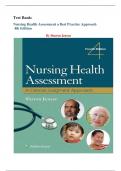Test Bank:
Nursing Health Assessment a Best Practice Approach
4th Edition
By Sharon Jensen
, Table of Contents
Chapter 1.The Nurse’s Role in Health Assessment
Chapter 2. Health History and Interview
Chapter 3. Assessment Techniques, Safety, and Infection Control
Chapter 4. Documentation and Interdisciplinary Communication
Chapter 5. Vital Signs and General Survey
Chapter 6. Pain Assessment
Chapter 7. Nutrition Assessment
Chapter 8. Assessment of Developmental Stages
Chapter 9. Mental Health, Violence, and Substance Use Disorder
Chapter 10. Cultural Assessment
Chapter 11. Skin, Hair, and Nails
Chapter 12.Head and Neck, with Vision and Hearing Basics
Chapter 13. Eye Assessment for Advanced and Specialty Practice
Chapter 14.Ear Assessment for Advanced and Specialty Practice
Chapter 15. Nose, Sinuses, Mouth, and Throat
Chapter 16. Thorax and Lungs
Chapter 18. Peripheral Vascular with Lymphatics
Chapter 19. Breasts and Axillae
Chapter 20. Abdominal Assessment
Chapter 21. Musculoskeletal Assessment
Chapter 22. Neurological and Mental Status
Chapter 23. Male Genitalia and Rectum
Chapter 24. Female Genitalia and Rectum
Chapter 25. Pregnancy
Chapter 26. Newborns and Infants
Chapter 27. Children and Adolescents
Chapter 28. Older Adults
Chapter 29. Assessment of the Hospitalized Adult
Chapter 30. Head-to Toe Assessment of Adult
,=
Nursing Health Assessment A Best Practice Approach 4th Edition Jensen
Test Bank
Chapter 1.The Nurse’s Role in Health Assessment
1. After completing an initial assessment of a patient, the nurse has charted that his respirations
are eupneic and his pulse is 58 beats per minute. These types of data would be:
a. Objective.
b. Reflective.
c. Subjective.
d. Introspective.
CORRECT ANSWER: A
Objective data are what the health professional observes by inspecting, percussing, palpating,
and auscultating during the physical examination. Subjective data is what the person says about
him or herself during history taking. The terms reflective and introspective are not used to
describe data.
DIF: Cognitive Level: Understanding (Comprehension) REF: dm. 2
MSC: Client Needs: Safe and Effective Care Environment: Management of Care
2. A patient tells the nurse that he is very nervous, is nauseated, and feels hot. These types of
data would be:
a. Objective.
b. Reflective.
c. Subjective.
d. Introspective.
CORRECT ANSWER: C
Subjective data are what the person says about him or herself during history taking. Objective
data are what the health professional observes by inspecting, percussing, palpating, and
auscultating during the physical examination. The terms reflective and introspective are not used
to describe data.
DIF: Cognitive Level: Understanding (Comprehension) REF: dm. 2
MSC: Client Needs: Safe and Effective Care Environment: Management of Care
3. The patients record, laboratory studies, objective data, and subjective data combine to form
the:
a. Data base.
b. Admitting data.
c. Financial statement.
d. Discharge summary.
CORRECT ANSWER: A
, Together with the patients record and laboratory studies, the objective and subjective data form
the data base. The other items are not part of the patients record, laboratory studies, or data.
DIF: Cognitive Level: Remembering (Knowledge) REF: dm. 2
MSC: Client Needs: Safe and Effective Care Environment: Management of Care
4. When listening to a patients breath sounds, the nurse is unsure of a sound that is heard. The
nurses next action should be to:
a. Immediately notify the patients physician.
b. Document the sound exactly as it was heard.
c. Validate the data by asking a coworker to listen to the breath sounds.
d. Assess again in 20 minutes to note whether the sound is still present.
CORRECT ANSWER: C
When unsure of a sound heard while listening to a patients breath sounds, the nurse validates the
data to ensure accuracy. If the nurse has less experience in an area, then he or she asks an expert
to listen.
DIF: Cognitive Level: Analyzing (Analysis) REF: dm. 2
MSC: Client Needs: Safe and Effective Care Environment: Management of Care
5. The nurse is conducting a class for new graduate nurses. During the teaching session, the
nurse should keep in mind that novice nurses, without a background of skills and experience
from which to draw, are more likely to make their decisions using:
a. Intuition.
b. A set of rules.
c. Articles in journals.
d. Advice from supervisors.
CORRECT ANSWER: B
Novice nurses operate from a set of defined, structured rules. The expert practitioner uses
intuitive links.
DIF: Cognitive Level: Understanding (Comprehension) REF: dm. 3
MSC: Client Needs: General
6. Expert nurses learn to attend to a pattern of assessment data and act without consciously
labeling it. These responses are referred to as:
a. Intuition.
b. The nursing process.
c. Clinical knowledge.
d. Diagnostic reasoning.
CORRECT ANSWER: A
Intuition is characterized by pattern recognitionexpert nurses learn to attend to a pattern of
assessment data and act without consciously labeling it. The other options are not correct.
DIF: Cognitive Level: Understanding (Comprehension) REF: dm. 4
MSC: Client Needs: General
7. The nurse is reviewing information about evidence-based practice (EBP). Which statement
best reflects EBP?




